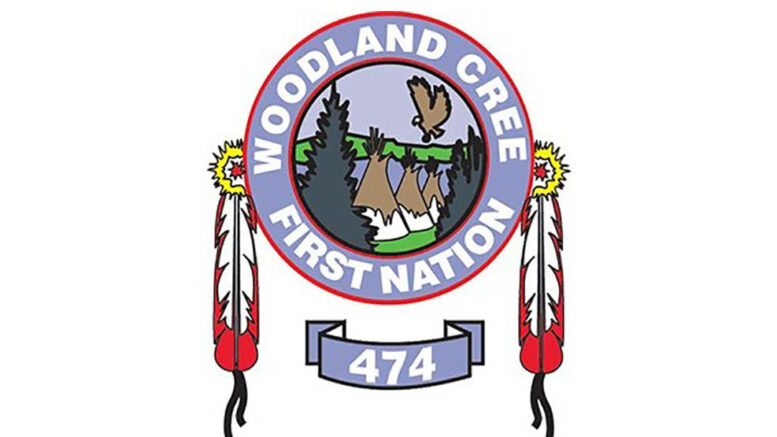By Jeremy Appel
(ANNews) – An oil company is attempting to have the chief of the Woodland Cree First Nation jailed for refusing to allow its drilling project to proceed on his nation’s traditional territory in northern Alberta.
As first reported by journalist Brandi Morin for IndigiNews and Ricochet, the First Nation has set up a blockade to prevent Obsidian Energy employees from accessing its land near Peace River.
On May 6, the company obtained an injunction against Woodland Cree First Nation and the people occupying the blockade camp. The First Nation has called Obsidian’s “intimidation tactics … the worst we’ve ever seen.”
A week later, Obsidian CEO Steven Loukas flew to the region for scheduled negotiations with representatives of the First Nation, including Chief Isaac Laboucan-Avirom, band council and their lawyer, at a Peace River hotel.
The talks didn’t last long, with the First Nation’s team leaving the meeting after less than 10 minutes.
After RCMP entered and exited the conference room where the oil company’s representatives remained, Woodland Cree Coun. Joe Whitehead Jr. and the nation’s legal counsel returned without Chief Laboucan-Avirom for about five minutes.
On his way out of the hotel, Laboucan-Avirom told Morin that he was leaving because Obsidian “had no intent to negotiate.”
When Morin approached Loukas for comment as he slipped out the back door, the oil executive would only comment on the Stanley Cup playoffs.
Within an hour, the First Nation received an email declaring that Obsidian intended to take legal action and have the chief arrested.
A request was filed in a Calgary court on May 14 to have the First Nation and its chief charged with contempt of court for violating its injunction, and asking that Laboucan-Avirom and other nation representatives be arrested and “placed into custody” until their blockade is dismantled.
It argues the First Nation is “obstructing Obsidian’s lawfully permitted activities and causing loss and damage to Obsidian.”
According to the filing, the RCMP has “indicated that they have no plans to enforce” the injunction.
An RCMP liaison confirmed Morin that the Mounties would prefer to facilitate “peaceful negotiations” between the company and First Nation.
Chief Laboucan-Avirom told Morin that his nation isn’t opposed to oil drilling on its territory per se, but that it wants a fair share of Obsidian Energy’s profits.
“If I get arrested for sticking up for our lands, sticking up for our treaty, sticking up for what we believe in,” Chief Laboucan-Avirom said, “I think that will be a shame on the province, on the country, and on industry. We’re more sophisticated than that, and we’re here to stay. [These are] our traditional lands, this is our backyard.”
He added that he wants “to develop a process that works for everyone.”
Another concern he identified is a series of earthquakes the Alberta Energy Regulator (AER) found were caused by Obsidian disposing industrial wastewater underground. One of these earthquakes, at a magnitude of 5.6, was the largest recorded in Alberta’s history.
Chief Laboucan-Avirom said he wants improved consultation and input on environmental standards for Obsidian’s operations on his nation’s territory.
The company, meanwhile, contends that Woodland Cree First Nation’s demands would establish “a monopoly in its favour,” which it argues would be unfair to the other First Nations in the region it’s partnered with.
But Woodland Cree, in a May 13 news release, says its blockade has support from “a growing number of First Nations in Alberta,” including Treaty 8 First Nations, Duncan’s First Nation, Sucker Creek First Nation and Loon River First Nation, among others, who have either joined the blockade encampment or written letters of support.
The blockade, which consists of about 100 people, including sympathetic industry partners, is set up like a traditional Cree camp, which includes a teepee, mobile kitchen, porta potties and lawn chairs.
Elders are bussed into the encampment daily to visit, play cards, trade stories, and offer support to band leadership.
At the same time, youth cut fresh moose harvested from the land and hang it to dry over an open fire.
Chief Laboucan-Avirom connected Woodland Cree First Nation’s displacement from its traditional lands to extractive industries.
“We want to continue to enhance our understanding of what’s going on because there’s also cumulative impacts and effects that surround us, whether it’s from pipeline spills, produced water spills, earthquakes, forest fire, drought. We want to control what’s in our backyard,” he told Morin.
The chief accused Obsidian, which produces 31,000 barrels of oil equivalent a day, of “manipulation” in pursuit of its efforts to increase production by 12 per cent this year.
“If they want to sustain development, they have to work with us in a meaningful way. It might be a lack of understanding. If you have an American company that does business in a certain way,” said Laboucan-Avirom.
Jeremy Appel is a Local Journalism Initiative Reporter.



Be the first to comment on "Oil company seeks arrest of Woodland Cree First Nation chief"